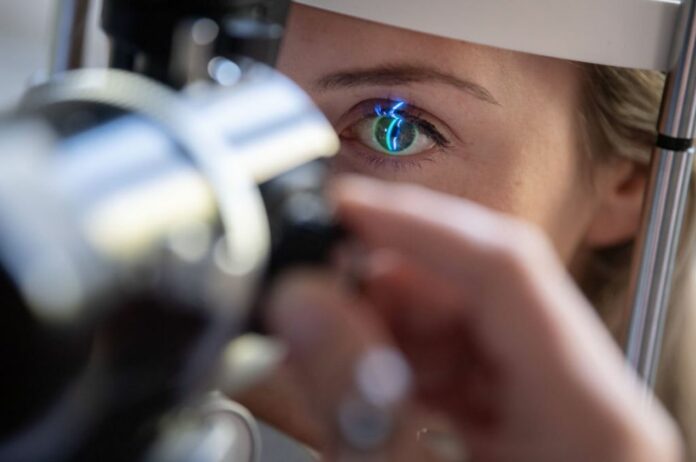A large UK Biobank study published in the open-access journal BMJ Open reveals that poor sleep quality, including too much or too little sleep, daytime tiredness, and snoring, is associated with an increased risk of developing irreversible eye disease – glaucoma.
The results show that people who are at high risk of getting glaucoma should get sleep therapy and that people with chronic sleep disorders should get eye exams to look for early signs of glaucoma.
An estimated 112 million individuals will have glaucoma by 2040, making it the most common cause of blindness worldwide.
The causes and factors that lead to it are still not well understood. It is characterized by the loss of light-sensitive cells in the eye and damage to the optic nerve. Untreated glaucoma can cause permanent blindness.
The researchers speculate that while universal screening might not be cost effective, screening specific populations at high risk might. And there’s evidence from the past to show that sleep problems are an issue, too.
The purpose of the study was to determine the association between insomnia, excessive or insufficient sleep, night or morning chronotypes (‘owls’ or ‘larks’), daytime sleepiness, and snoring with the development of glaucoma.
They used information about the sleep habits of 409,053 UK Biobank participants who were all between the ages of 40 and 69 when they were recruited in 2006–2010.
Sleep time was classified as either too little or too much if it fell outside of the typical range (7 to less than 9 hours per day). A person’s chronotype was determined by whether they self-identified as a morning person or a night person.
The degree of insomnia—difficulty falling asleep or frequent waking—was described as never/sometimes or usually, and subjective daytime sleepiness was classified as never/rarely, or frequent, or sometimes.
Background information was gathered from the questionnaires people filled out when they were recruited. This included their age (the average was 57), gender, race or ethnicity, level of education, lifestyle, weight (BMI), and how poor their neighborhood was.
All participants’ health and survival were monitored using medical records and death registry data until a first glaucoma diagnosis (hospital admission), death, emigration, or the end of the monitoring period (31 March 2021), whichever occurred first.
Over the course of an average follow-up time of 10.4 years, 8690 cases of glaucoma were reported.
In comparison to those without the condition, those with glaucoma tended to be older, more likely to be men, lifelong smokers, and to have high blood pressure or diabetes.
Excluding chronotype, the other four sleep patterns/behaviors were all linked to an increased risk of glaucoma.
Short or long sleep duration was linked to an 8% higher risk, insomnia to a 12% higher risk, snoring to a 4% higher risk, and daytime sleepiness to a 20% higher risk.
Snorers and those who reported daytime sleepiness also had a 10% higher risk of glaucoma than those with a healthy sleep pattern, while insomniacs and those with a short/long sleep duration pattern had a 13% higher risk.
Even though there are different kinds of glaucoma, the results were still the same.
As an observational study, its primary limitation is its inability to determine causation. The researchers note that the study only represented one point in time and relied on self report rather than objective measurement. They add that glaucoma may affect sleep patterns on its own, rather than the other way around.
But, say the researchers, there are possible biological explanations for the links found between sleep problems and glaucoma.
The researchers explain that lying down and when sleep hormones are out of balance, as they are in insomnia, cause an increase in the internal pressure of the eye, a crucial factor in the development of glaucoma.
They indicate that depression and anxiety, which frequently accompany sleeplessness, may also produce an increase in internal eye pressure due to dysregulated cortisol production.
In the same way, it has been suggested that sleep apnoea, which is the sudden stopping of breathing during sleep, could cause direct damage to the optic nerve through repeated or long-lasting low levels of oxygen in cells.
The researchers write in their conclusion: “As sleep behaviours are modifiable, these findings underscore the necessity of sleep intervention for individuals at high risk of glaucoma and potential ophthalmologic screening among individuals with chronic sleep problems to help prevent glaucoma.”
Source:10.1136/bmjopen-2022-063676
Image Credit: Marijan Murat/picture alliance via Getty Images
You were reading: Poor Quality Sleep Increases Internal Pressure Of The Eye – A Risk Factor For Glaucoma
